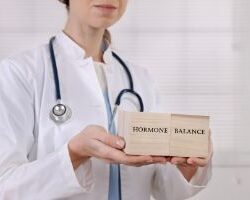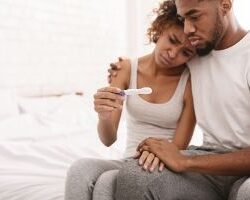
If you’re suffering from irregular periods and various health issues, you may be researching the differences between PCOS vs. endometriosis. While these two separate conditions have a few symptoms in common, they are very different health conditions. In this post, you’ll find information on these two conditions: 1. PCOS and what you should know about this cause of infertility and 2. endometriosis and how it can lead to fertility issues. We also discuss details about PCOS and endometriosis and getting pregnant. As always, our team at The Fertility Institute of New Orleans can help diagnose and treat conditions like these if you’re hoping to conceive.
Do I have PCOS? Common PCOS symptoms
Polycystic ovary syndrome (PCOS) is a hormonal disorder that interferes with the growth and release of eggs from the ovaries. When a woman’s body overproduces certain hormones, the imbalance prevents fluid-filled sacs in the ovaries from breaking open and releasing mature eggs. The ovaries become enlarged and are covered with pearl-sized, fluid-filled cysts.
Those with PCOS may experience the following symptoms:
- Weight gain or trouble losing weight
- Excess hair on the face and body
- Irregular menstrual cycles
- Acne
- Thinning hair
- Pelvic pain
- Increased stress levels
- Anxiety
- Depression
- Decreased sex drive
The production of excess male hormones, such as androgens, contributes to these types of symptoms. You can learn more about PCOS symptoms and treatment in our earlier post here.
Do I have endometriosis? Common endometriosis symptoms
On the other hand, endometriosis is a separate disorder that’s unrelated to PCOS. It involves the endometrium, a type of tissue that lines the inner part of your uterus. Sometimes, a similar type of tissue can grow outside of the uterus. This excess layer of tissue continues to act as it normally would, but not in proper conjunction with the body. Regular uterine lining separates and bleeds out of the body during each menstrual cycle, but these external tissues aren’t released. Instead, they stay and grow within the body, leading to the condition of endometriosis.
Those with endometriosis may experience the following symptoms:
- Pelvic pain
- Abdominal pain
- Lower back pain
- Pain after sexual intercourse
- Menstruation that may be heavier than normal
- Bleeding or spotting between regular menstrual cycles
- Diarrhea during menstruation
- Constipation during menstruation
- Nausea
- Heightened fatigue
Cysts can also form in the areas around the uterus, leading to scarring and other issues.
Diagnosing PCOS vs. endometriosis
The best way to learn if you have PCOS or endometriosis is to talk to your doctor. When it comes to PCOS vs. endometriosis, the symptoms can often be similar. Through diagnostic testing and a thorough health evaluation, your doctor will be able to determine which condition you’re suffering from.
Keeping track of your symptoms and menstrual calendar is also important, as this can aid in diagnosis.
Can you have endometriosis and PCOS?
You may be looking at these symptoms and finding that you identify with both lists. Can you have endometriosis and PCOS? In short, the answer is yes.
While rare, people can suffer from both conditions at the same time. In general, they’ll experience irregular and heavy periods, excess hair growth, as well as chronic pelvic pain. Because of the irregularity in menstruation, it often results in an inability to become pregnant as we’ll explore shortly.
Living with endometriosis and PCOS
When you’re living with endometriosis and/or PCOS, there are usually unpleasant symptoms and side effects. If you’re not planning to get pregnant, birth control medications can help balance hormone levels and decrease symptoms in both. This is especially true when you’re searching for an endometriosis treatment option because it slows the growth of endometriotic tissue.
In cases of endometriosis, your doctor may also recommend laparoscopic surgery to excise portions of the endometriotic tissue from around your uterus and ovaries. This is done to restore your pelvic anatomy and remove large cysts.
For additional PCOS treatment options, there are lifestyle changes that can reduce your symptoms to improve your overall quality of life. For example, losing weight by exercising and eating a PCOS friendly diet have been proven to help many patients. Your doctor may also recommend supplements like chromium, vitamin D, or inositol, depending on any deficiencies.
Understanding PCOS vs. endometriosis and getting pregnant
While separate, both of these two conditions can make it difficult to become pregnant in different ways. PCOS causes complex changes in the hypothalamus and pituitary glands, which can affect ovulation. Endometriosis causes inflammation and scarring that can lead to poor egg quality.
Fortunately, there are infertility treatment options that can help when you’re living with endometriosis or PCOS. Ovulation-inducing medications can stimulate your ovaries to boost fertility. The most common of these is clomiphene citrate. Other medications like metformin can help reduce insulin levels. These make ovulation-inducing medications more effective and assist in weight loss. Hormonal therapy may be another option.
Finally, in vitro fertilization (IVF) is another method for conceiving when you are living with endometriosis or PCOS. IVF stimulates ovulation, allowing your doctor to retrieve healthy mature eggs from the ovaries. These eggs are then fertilized and monitored in a laboratory. Viable embryos are placed in your uterus three to five days later. Implantation and embryo development follows just as it does in a natural pregnancy. You can learn more about how IVF works here.
At The Fertility Institute, we’ve helped our patients achieve healthy pregnancies for more than thirty years. If you’re suffering from endometriosis or PCOS, contact us to schedule an initial consultation. We can help you start the family of your dreams.



